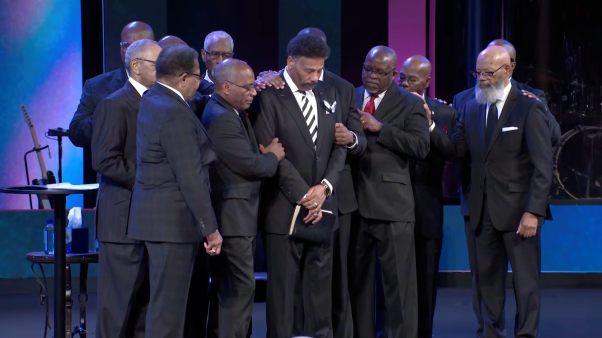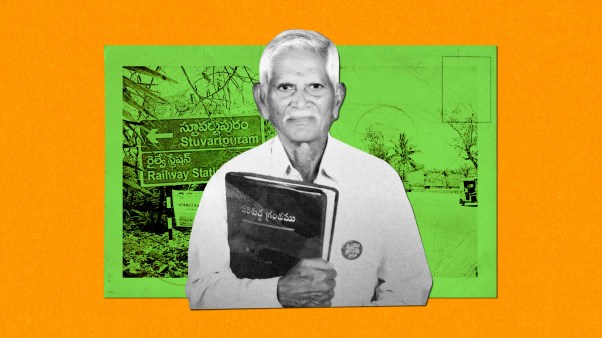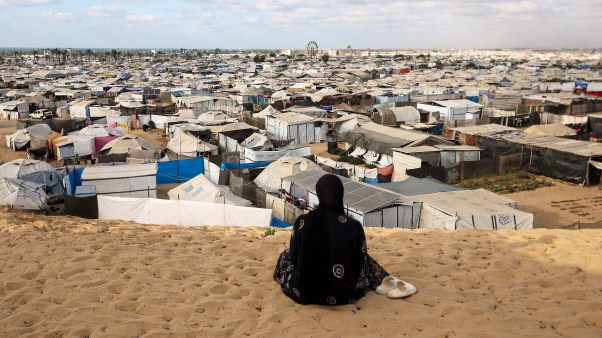American policy toward embassy guests warms, and European support builds.
For an update on the situation of the seven Pentecostal believers confined in the American Embassy in Moscow, CHRISTIANITY TODAY turned to Kent R. Hill, the assistant professor of history at Seattle Pacific University who was in Moscow when they first made their dash for freedom. He translated the voluminous written narrative of the seven into English for biographer John Pollock and became their friend.
When the “Siberian Seven” arrived at the American embassy in Moscow on June 27, 1978, they were seeking assistance in emigrating from the Soviet Union on grounds of religious persecution. They expected their visit to be short. It was not. The brutality of Soviet militia stationed in front of the embassy transformed a brief visit into a desperate plea for asylum. The de facto asylum that resulted recently entered its fourth year, and there is still no diplomatic solution in sight.
The diplomatic stalemate could immediately be resolved if the Soviets would simply grant the Vaschenko and Chmykhalov families (including members at home in Siberia as well as those in the embassy) the necessary emigration visas. Soviet refusal to cooperate in this matter could perhaps have been expected. What was not expected was U.S. reluctance actively to support the case. Nevertheless, for over two-and-a-half years, the U.S. Department of State and its embassy in Moscow seemed far more concerned with convincing the refugees to leave the safe confines of the American compound than in pressuring the Soviets to grant them their freedom. Since about February 1981, however, there has been a very encouraging change of attitude on the part of the American embassy.
Not only have the Siberian Seven suffered from the initial refusal of American government authorities to pursue their case actively, they have also suffered from the neglect and apathy of the American church community. Many thousands of individual American Christians have given support at the grassroots level, and a few organizations and journals have lent support. But most Christian leaders and organizations in this country have chosen to remain silent. In large part that explains why the Siberian Seven are still almost completely unknown to the majority of American Christians. In contrast, European Christians have been much more responsive to the desperate plight of these victims of Soviet religious persecution.
A successful resolution to this diplomatic stalemate may depend on the willingness of the government and the Christian community at large in this country to join with their European counterparts in putting pressure on the Soviets to release the Siberian Seven and their families. Their fate may well hang in the balance.
First, we must review how the Americans handled the situation during the first two-and-a-half years, the period when the Siberian Seven could best be described as unwanted guests in the U.S. Embassy in Moscow. From the first, American officials repeatedly asserted that the State Department and Moscow embassy were doing everything they could to encourage the Soviets to grant the Vashchenkos and Chymkhalovs permission to emigrate. Furthermore, U.S. and embassy officials always maintained that the Siberian Seven would not be forced to leave the embassy.
There were persistent reports, however, both in this country and abroad, that the actual U.S. policy was to discourage the families from staying. The embassy deliberately minimized publicity and deprived the families of free contact with those who were willing to provide them with moral support. For many months, consular officers repeatedly denied permission to many members of the diplomatic community in Moscow, as well as numerous visitors from the West, to meet with the families. A variety of firsthand observers have confirmed that the embassy refused to allow correspondents to interview the families in the room where they live, refused to allow the news media to photograph or film them in their room, and maintained a limited access list of those permitted to see the families.
In a concerted effort to isolate as much as possible the Siberian Seven from the support of Christians in the West, embassy officials even refused to show the families copies of letters sent via international mail—rather than by diplomatic pouch, at the American embassy’s insistence—the originals of which had been confiscated by the Soviets. The U.S. government’s policy during this period, though it physically maintained the familes at the Moscow embassy, clearly was unsupportive and at times bordered on outright harassment.
The coolness of American policy toward the Russian refugees did provoke some reaction in the West, though not much. Kevin Lynch wrote several articles for National Review (Aug. 31, 1979; Mar. 21, 1980; April 3, 1981), documenting the negative side of American policy toward the Siberian Seven. Vladimir Bukovsky, the well-known Soviet dissident, attacked U.S. harassment of the Siberian Seven in a letter to the editors of Time, printed in its issue of June 4, 1979. Bukovsky, best known in the West for his role in exposing the Soviet practice of using psychiatric hospitals as political prisons, continued his assault on U.S. policy in mid-1979 in an address to the Coalition for a Democratic Majority.
Few Americans, however, ever became aware of U.S. policy regarding the Siberian Seven. Many still did not know who they were, let alone how they were being treated.
The Siberian Seven have requested political asylum in the embassy because they fear for their lives. Since arriving at the embassy, 1,500 pages of their autobiographies and documents have been translated into English and formed the basis for The Siberian Seven, written by John Pollock. Published by Word, this 276-page volume is one of the best-documented accounts of the persecution of Christians by the Soviet government.
The struggle of the Siberian Seven to emigrate to the West spans almost two decades and encompasses almost all of the types of sufferings that Christians behind the Iron Curtain have had to bear: violent disruption of church services, abduction of children from Christian parents for placement in state orphanages, confinement in labor camps and psychiatric hospitals, and mysterious deaths. Pollock’s book provides numerous examples of the petty harassments that are a daily occurrence for several million Russian Christians. The official papers provided by the Siberian Seven impressively corroborate and highlight a wide variety of sources already available in the West on the conditions of Christians behind the Iron Curtain.
Now that the families have allowed their account of Soviet persecution to be published in the West, they have no alternative but to remain in the embassy until their case is favorably resolved. On July 27, former British Foreign Secretary David Owen summed up the plight of the refugees as follows:
“The Siberian Seven are a very good example of the gravity of the human rights situation inside the Soviet Union, and I have long supported both publicly and privately that they should be allowed out of the Soviet Union. I do not think there is any way that they could return to their families without fear of persecution and harassment.”
In view of the real danger that awaits the refugees outside the American embassy, how can we account for the tireless efforts of U.S. officials to convince the families to leave it?
A major factor that certainly contributed to the government’s initial reluctance to publicize this highly unusual story, especially during the early months of the group’s stay in the embassy, was the fear that the Senate ratification of the SALT II agreement would be jeopardized. It was assumed that Soviet violation of agreements guaranteeing freedom of religion and emigration would call into question the whole issue of Soviet trustworthiness on new international agreements. With the failure of SALT II to be ratified by the Senate and the election of a more conservative president and Congress, this particular impediment to support and publicity was removed.
A second factor is the view that it is not in the best interests of the U.S. to intervene. If the U.S. government actively intercedes with the Soviet government on behalf of these seven Christians, will not American embassies throughout the Communist world be deluged with squatters? This question has been raised from time to time during the past three years.
The evidence is conclusive, however, that this particular case need not set a dangerous precedent. The seven did not break into the embassy demanding to emigrate or be given political asylum. They came with an official letter from U.S. Embassy officials authorizing their entry into the embassy to discuss emigration. It was only when the Soviet militia in front of the embassy refused to honor the letter that the situation fundamentally changed. The apprehension and subsequent abuse of John Vashchenko was the incident that turned a routine visit to the embassy into a desperate plea for asylum.
The Saga of the Seven
Here, in barest outline, is the story of the Siberian Seven.
Peter Vaschenko grew up in a lay preacher’s family driven from its home and forced to wander for two years before finding a Siberian village that tolerated them. He found it easier to be a secret believer as he went to school and then off to war. Only after he married and moved to Chernogorsk did he and his wife, Augustina, become active Christians.
Khrushchev’s great persecution caught up with them in 1961. They were constantly harassed inside and outside the church. Three of their children were abducted and placed in a state school to be indoctrinated in atheism.
This was the last straw for Vaschenko. He took his family and some others to Moscow and applied for exit visas. The authorities called them crazy and sent them home. Peter was imprisoned.
Shortly after, in 1963, his wife and three of his children were among 32 Siberian Christians who rushed into the American embassy in Moscow and begged for help in securing permission to leave Russia. They were eventually persuaded by Soviet officials to return home and await legal papers. But once back in Siberia, the believers were arrested and punished.
During the years of persecution that ensued, the Vaschenko family still hoped authorities would grant them permission to emigrate. They managed two more cross-continent trips to the embassy in 1968 and 1975. When they received a mail invitation, or offer of sponsorship, in April 1978, they laid plans for their final attempt, and were joined by two members of the Chmykhalov family.
The lives of these people are in grave danger if they leave the embassy. This is the internationally recognized justification for seeking and obtaining political asylum. If the U.S. government simply points out the highly unusual circumstances that compelled the families to remain in the embassy, and particularly the fact that they came with a written invitation, then it can vigorously pursue securing emigration for these refugees without fear of establishing a precedent for allowing unwarranted embassy sit-ins.
Government policy relative to the Siberian Seven never became a major campaign issue in the recent presidential elections. However, during a radio commentary in 1979, Ronald Reagan did criticize the Carter administration’s handling of the situation. “Détente,” observed the Republican nominee, “is a two-way street. Our wheat and technology can get into Russia—why can’t the Vaschenko and Chmykhalov families get out?”
Fortunately, there has been a clear change in embassy policy since about February of this year. Correspondents are now allowed to interview the families in their quarters, rather than in the courtyard. The access list has been eliminated. U.S. citizens are allowed to visit the families in their room, and so may foreigners, provided they first check with the consular section. The seven are now allowed to socialize with other Americans in their apartments, which lie within the safety of the American compound. In addition, the families are now permitted to do unpaid work within the embassy. American authorities have been in contact with important Soviet officials, although it is not yet clear if the negotiations are bearing fruit. The present embassy handling of the situation seems to reflect a genuine change of attitude.
Efforts to influence the U.S. Congress have met with partial success. On May 9, 1980, 50 senators sent a letter to Brezhnev requesting that the Vashchenko and Chmykhalov families be allowed to emigrate. Sen. Carl Levin of Michigan has been most outspoken on behalf of the families in the embassy. On June 27, 1980, he introduced S. 2890, a bill that would have granted both families “permanent residence status” in the United States. The bill would probably have passed, but it never cleared Sen. Edward Kennedy’s Judiciary Committee. The bill was reintroduced as S. 312 in the new session and thus far has more than 60 cosponsors. Once more it is hung up in committee, this time a subcommittee on immigration. Prospects for passage are good—if Christians throughout the United States make it clear to their senators that they wish it to be supported.
Unfortunately, it is widespread support by Christians that has been so noticeably lacking during these past three years. The original core of people who came in contact in Moscow with the Siberian Seven have remained steadfast in their efforts to effect a positive resolution of their quest for emigration. Others have joined the campaign and devoted many hours and days to working on their behalf. The Siberian Seven chronicled the intriguing and gripping story of fellow believers in desperate need of help, but American Christians have preferred to read other less-demanding materials that would not evoke pain.
Then, of course, the Siberian Seven are Pentecostals, and many are reluctant to become involved with Pentecostals. Christians in the West have the luxury of not having to be united to protect their interests, and so we have made disunity a virtue. It does not seem to matter that the theological issues that separate a Baptist from a Pentecostal, for example, are infinitesimally small in comparison to what they have in common. Nor does it matter that behind the Iron Curtain, Soviet officials persecute Russian Orthodox, Baptist, and Pentecostal believers alike because of their devotion to God, not because they do or do not speak in tongues. One of the most impassioned defenders of the Siberian Seven, Vladimir Bukovsky, is not even a Christian. In stark contrast, Christian leaders and organizations in this country have often been silent, or at best, timid.
The response of Christian organizations in the U.S. has been perplexing. Both “liberal” and “conservative” groups have been unwilling to offer much assistance. The National Council of Churches, the Pentecostals, and the Baptists have all shown a certain reluctance to protest actively the treatment of Christians behind the Iron Curtain. The reasons for this reluctance are complex, but basically revolve around the successful way in which the Soviet Union has utilized a policy of allowing “registered” church leaders to travel in the West.
These officially sponsored leaders tell American church officials that there is really very little problem in the Soviet Union with respect to persecution. Besides, if Americans do protest, it will simply mean that even the “registered” leaders will be cut off from their Christian brothers in the West. The Soviet ploy has proven amazingly successful with rather gullible church leaders in the West, especially in the U.S.
Nevertheless, there have been some important efforts to aid the Siberian Seven and publicize their situation. Most Christian organizations in the West that work with Christians behind the Iron Curtain or publish materials about them have sought to make their constituencies aware of their plight. Evangelism to Communist Lands included some footage of the Siberian Seven in a recent film, Let My People Go. In Texas, Christ for the Nations has furnished considerable help. The two most important organizations in the U.S. working on behalf of the seven are the Research Center for Religion and Human Rights in Closed Societies and the Society of Americans for Vashchenko/Chmykhalov Emigration (S.A.V.E.). The latter is headed by Cecil Williamson, minister of Crescent Hill Presbyterian Church in Selma, Alabama. It was Williamson and his congregation that sent the official invitation for the Vashchenkos to emigrate to America. Jane Drake, S.A.V.E. secretary, has worked tirelessly for many months to keep Christians concerned about the Siberian Seven informed about recent developments.
The New York—based Research Center for Religion and Human Rights in Closed Societies, publisher of the respected journal Religion in Communist Dominated Areas, has been a crucial nerve center for the dissemination of accurate and current information on the Siberian Seven. Blaho and Olga Hruby are the driving forces behind this effort. It was in their journal that the first detailed account of the story of the seven appeared in 1978. They have provided important information and advice to officials on Capitol Hill and to S.A.V.E. Olga Hruby has been instrumental in arranging for English language instruction for the seven and is at present seeking to set up tutoring in the embassy that will lead to high school equivalency diplomas for several of the young people who are members of the group.
Yet, despite publication of The Siberian Seven, despite the selfless efforts of several hundred Americans, millions of Christians in this country have not been reached or motivated to action. Considerably more success has been achieved in Europe.
The most important organization to support the campaign on behalf of the seven on the Continent has been the Zurich-based Christian Solidarity International. President Hans Stückelberger’s organization has been involved for three years in publicizing throughout Europe the plight of the families. An active effort has been made to recruit fellow Christians through materials in French, German, and Swedish. The Swedes have been particularly responsive.
Marianne Ridge has been in charge of the Christian Solidarity International program. She has devoted herself to the task with unusual perseverance and is largely responsible for the fact that the Vashchenkos and Chmykhalovs receive letters today via international mail. American officials have insisted throughout that they cannot deliver mail addressed to the Russian families that arrives at the embassy via diplomatic pouch. They contend this is a violation of mail agreements with the Soviets, and only correspondence that comes through the international route (that is, through the hands of the Soviets) can be given to the refugees. This meant, of course, that virtually all of the mail from Western Christians was confiscated during the early months of their stay in the embassy. Ridge established a system whereby Christians in the West sent copies to Christian Solidarity International of the letters they mailed to the embassy. She kept track of how many of the originals arrived at the embassy and publicized the figures in the West, showing how few letters were getting through. The Soviets are now allowing much of the mail to reach the embassy—a change that is due in large part to the efforts of Christian Solidarity International.
Initial support for the Siberian Seven in England centered on the efforts of John Pollock, author of The Siberian Seven, and of Keston College. Hodder and Stoughton published the book in 1979, several months before the American edition was available. The English edition is now completely sold out. Keston College in Kent is operated by the Society for the Study of Religion Under Communism. It is under the direction of Michael Bourdeaux and publishes the journal Religion in Communist Lands. Bourdeaux and Keston College are recognized throughout the world for their scholarly and careful study of religion behind the Iron Curtain. From the first, they have done what they could to publicize the plight of the Siberian Seven.
It was not until last spring, however, that a major British campaign was launched on behalf of the Russian Christians stranded in the U.S. Moscow embassy. The impetus for it emerged from an interview Dan Wooding conducted I with me in Seattle. Upon Wooding’s return to Britain, and with the support of the Seattle-based “Friends in the West” (headed by Ray Barnett), the “Campaign to Free the Siberian Seven” was launched in Great Britain.
In contrast to the United States, the response of the Christian community in Britain was enthusiastic. A key factor in generating this response was the active involvement of Christian leaders and organizations. Peter Meadows, publishing editor of Buzz Magazine (Britain’s largest-selling interdenominational Christian monthly), took the lead in forming a British committee that included Bourdeaux, Pollock, and David Atkinson (member of Parliament). Danny Smith, former communications executive in Europe for World Vision, was recruited to head the campaign to aid the Moscow refugees. On April 7, the Manchester Guardian carried a story announcing to the British public the creation of the committee.
The British committee focused its initial efforts on achieving two objectives: mobilizing the Christian community in Britain to speak out on behalf of the Siberian Seven, and organizing a demonstration in London’s Trafalgar Square, which was set for June 27—the three-year anniversary of the Russian Christians’ arrival at the American embassy. They succeeded in both areas. Special “action packs” were prepared for distribution to churches and concerned individuals throughout Britain. Included in the materials were a tape/slide presentation, leaflets on what the situation was and what Christians could do to help, buttons, and so on. Over 700 such action packs have been dispersed thus far.
The Trafalgar Square demonstration not only occurred, but it attracted the attention of the British press. It was preceded on June 25 by a press conference organized by the “Campaign to Free the Siberian Seven” committee. All the major news media were present. A call was placed at the conference to the American embassy in order to speak with the Siberian Seven. Britain’s foremost authority on religion behind the Iron Curtain acted as interpreter for the conversation. The BBC devoted a full eight minutes to coverage of the press conference.
Two days later the demonstration took place. More than 3,000 Christians participated, and national press coverage was excellent. Between 3:30 and 5 P.M., the demonstrators were addressed by several members of Parliament and listened to tapes sent to Britain from the Siberian Seven. They also heard a firsthand report on the condition of the refugees from Danny Smith, who had just returned froma visit to Moscow. The demonstrators then marched to the Soviet embassy in London, arriving there by 7 P.M. About 500 of the demonstrators squeezed into a church near the embassy to begin an all-night, 12-hour prayer vigil for the Siberian Seven.
Throughout the night, 12 demonstrators stood across from the Soviet embassy holding pictures of the Russian refugees. Every 45 minutes they were replaced by 12 new protesters from the church where the all-night prayer vigil was being held. Ray Barnett and Danny Smith attempted to present to Soviet officials a 22-foot-long petition requesting emigration permission for the seven. The Soviets refused to accept the petition, which contained the signatures of several thousand British Christians. The whole episode was covered by national television, making its way into millions of households throughout the British Isles, and thereby greatly increasing public awareness of the plight of the Siberian Seven.
Another important aspect of the British committee’s work has been to involve Parliament in the case. A week before the June demonstration, David Alton (Liberal M.P.) raised the issue in the House of Commons in the form of an “early day motion.” If such a motion receives the endorsement of at least 100 members of Parliament, it is submitted to a government secretary and receives an official response. The British committee contacted by mail each member of Parliament as well as the House of Lords, and well over 100 have already pledged their support.
The issue has proven to be nonpartisan, attracting the support of Conservative, Liberal, and Labour members of Parliament. The list of those supporting the “Campaign to Free the Siberian Seven” is quite impressive: Winston Churchill (M.P. and grandson of the late prime minister), Clement Freud (M.P. and grandson of Sigmund Freud), Sir Hugh Frazier (House of Lords), Lord Chalfont (House of Lords), David Steel (leader of the Liberal party), and David Owen (former foreign secretary and leader of the new Social Democratic party). The Christian rock star Cliff Richard also has publicly endorsed the cause.
The British committee is now occupied in its biggest project to date: the attempt to arrange a joint invitation from 300 British churches to the Siberian Seven and their families to emigrate to England. The archbishop of Canterbury recently committed himself to appeal publicly on behalf of the “Siberian Seven.”
What are the prospects for a successful resolution of this protracted struggle by the Siberian Seven to emigrate to the West? In a word, uncertain. Supporters of the Vashchenkos and Chmykhalovs in the West are well aware that it is not within the powers of the U.S. government to grant the families the right to emigrate. Ultimately that decision must remain with the Soviets. It is, however, within our powers to provide the families with our full support while they are in the embassy and to make their difficult stay as pleasant as possible. This becomes particularly crucial in light of the very severe psychological pressures to which the families in the embassy are subject while their case drags on with no end in sight.
In the past, the Soviets have shown themselves vulnerable to public pressure from the West. Consider, for example, the successes in Jewish emigration brought about by a committed Jewish and human rights lobby. There are far more Christians in this country than Jews, but they are silent and disunited. If they raised their voices in protest, they would not only guarantee U.S. government support of the case, but might well have an influence on the Soviets who seek to avoid negative publicity whenever possible.
It would be well to remember the words of Edmund Burke: “The only thing necessary for the triumph of evil is for good men to do nothing.” The ultimate fate of the Siberian Seven may well test our awareness of that truth.
Five Steps You Can Take
What American Christians Can Do To Help The Seven
Join the “Free the Siberian Seven” campaign. Modeled after the very successful and ongoing British campaign (sponsored by Buzz Magazine) on behalf of the Russian refugees, this is the most ambitious American project thus far undertaken. Friends in the West is coordinating this nationwide endeavor to publicize the plight of the Siberian Seven to American Christians and to give practical suggestions on what they can do to help. The campaign is not intended to supplant projects of other organizations now under way, but to provide a means to inform and mobilize the Christian community as a whole—something that so far has not been achieved.
Special “Action Packs” have been prepared that include a tape/slide presentation. The 50 slides and taped commentary will enable congregations and Christian organizations to become familiar with the Siberian Seven. Also included in the packet is a magazine providing detailed information on the refugees and what Christians can do to aid them. Bracelets carrying the names of individual members of the Siberian Seven are available as prayer reminders.
The “Action Packs” are available by writing Friends in the West, P.O. Box 66515, 14925 22nd Avenue S.W., Seattle, Washington 98166, or by calling toll free in continental U.S. the “Action Line” number: (800) 331–1750, operator 602 (in Oklahoma, [800] 722–3600, operator 602).
Further information about the “Free the Siberian Seven” campaign can be obtained by calling the “Action Line” number, and orders can be placed for specific materials (written information, bracelets, etc.), if the entire “Action Pack” is not needed. Because the “Action Packs” are expensive to produce, a $25 donation is requested, though not required.
Support the Society of Americans for Vashchenko/Chmykhalov Emigration (S.A.V.E.). This group has worked hard to keep Christians informed on recent developments in the case and on what they can do to help. Though hampered by a relatively small mailing list and limited resources, S.A.V.E. deserves support. Contributions are solicited, and they will be glad to put you on their mailing list for updating of information and action suggestions: S.A.V.E., Jane Drake, Secretary, Route 1, Box 49-A, Pike Road, Alabama 36064.
Write the Siberian Seven. In all of the enthusiasm to write governmental officials and publicize the case, supporters frequently forget that the Siberian Seven are in desperate need of encouragement. Augustina Vashchenko, for example, must sit in the embassy day after day and wonder how her small children at home are faring. Parents and relatives get sick and die, the children suffer without their parents, and the family members in the embassy feel helpless.
Letters of love and support from Christians in the West are a great boost to morale. Answering the letters is a healthy use of their time and confirms for them that they are not forgotten in Moscow. Reading The Siberian Seven by John Pollock is helpful for concerned Christians in the West who, in writing to them, want to know something about their lives. But in any case, the seven are pleased simply to hear from American friends concerned about their welfare.
It is suggested that letters be addressed to individual members of the Siberian Seven, rather than to the whole group. The names and birthdays of the seven are as follows:
Peter Vaschenko: October 30, 1927; Augustina Vashchenko: March 28, 1929; Lida Vaschenko: March 6, 1951; Lyuba Vaschenko: December 17, 1952; Lila Vaschenko: July 16, 1957; Maria Chmykhalov: June 19, 1922; Timothy Chmykhalov: April 30, 1962.
The American embassy in Moscow requires that letters to the Siberian Seven be sent via international mail using the following address:
Peter Vaschenko (for example)
Embassy of the U.S.A.
Ulitsa Chaikovskogo 19/21
Moscow, USSR 117234.
To prevent unnecessary delays, it is best to send letters airmail. Although the mail must pass through the hands of the Soviets, delivery has been quite good in recent months if it carried clear indication at the top of letters that a copy was being sent to an agency that monitors delivery of the original letters to the embassy. The best place for Americans to send copies of their letters is to: Religion in Communist Dominated Areas (RCDA), 475 Riverside Drive, New York, New York 10027. The Hrubys of RCDA also operate with very limited financial resources and are worthy of financial support.
Write letters to government officials. It is absolutely essential that American authorities are convinced that the Christian community in this country fully support efforts by the U.S. government to do whatever it can to convince the Soviets to grant the Vashchenkos and Chmykhalovs the right to emigrate to the West. Christians should commend the American embassy for its fine support of the Siberian Seven since early in 1981 and urge that this positive treatment of the case be continued as long as necessary.
It is particularly important that Christians write their senators and ask them whether they are supporting S. 312, the bill that would grant the Vashchenkos and Chmykhalovs “permanent resident status” in the United States. Christians should express their own support of the bill as one important way in which the American government can indicate to the Soviets its commitment to a successful resolution of this thorny dilemma.
In addition to letters from individuals, churches, missionary groups, youth clubs, civic organizations, Bible studies, nursing homes, and so on can also send petitions to government officials expressing their concern and support. Important addresses are:
President Reagan
The White House
Washington, D.C. 20500
Your Senator
U.S. Senate
Washington, D.C. 20510
Your Representative
U.S. House of Representatives
Washington, D.C. 20510
Hon. Alexander M. Haig, Jr.
Department of State
Washington, D.C. 20520
Hon. Arthur Hartman
Embassy of the U.S.A. in Moscow
A.P.O., New York, N.Y. 09862
Ambassador Anatoly Dobrynin
Embassy of the USSR
1125 16th Street N.W.
Washington, D.C. 20036
Pray. Christians should pray for the successful resolution of this tragic stalemate, for the morale and spiritual health of the Siberian Seven, and for the inspiration and discipline to do everything within their power to effect a positive resolution of the issue.



